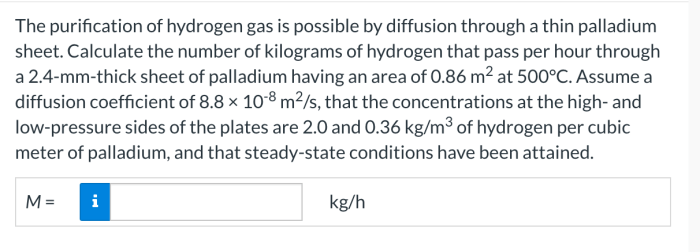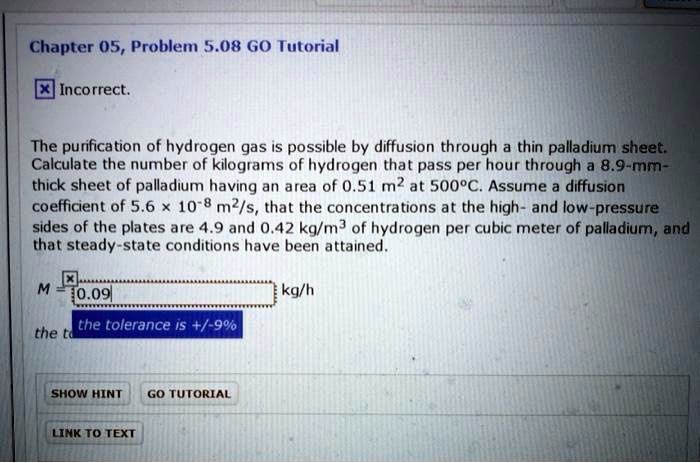The purification of hydrogen gas is possible by diffusion, a process that holds immense potential for various applications. This comprehensive guide delves into the intricacies of diffusion-based hydrogen gas purification, exploring its mechanisms, methods, and efficiency-influencing factors.
Diffusion, a fundamental physical process, plays a pivotal role in separating hydrogen gas from other gases. By understanding the mechanisms involved, scientists and engineers can harness this phenomenon to develop innovative and efficient hydrogen purification technologies.
Purification of Hydrogen Gas by Diffusion

Diffusion is a mass transfer process that occurs when a gas moves from an area of high concentration to an area of low concentration. This process can be used to purify hydrogen gas by separating it from other gases. Hydrogen gas is lighter than most other gases, so it will diffuse more quickly through a membrane than heavier gases.
This difference in diffusion rates can be used to separate hydrogen gas from other gases.
Mechanism of Diffusion-Based Hydrogen Gas Purification, The purification of hydrogen gas is possible by diffusion
The mechanism of diffusion-based hydrogen gas purification involves the following steps:
- The hydrogen gas is passed through a membrane that is permeable to hydrogen gas but impermeable to other gases.
- The hydrogen gas diffuses through the membrane, leaving the other gases behind.
- The purified hydrogen gas is collected on the other side of the membrane.
Methods and Applications of Diffusion-Based Hydrogen Gas Purification: The Purification Of Hydrogen Gas Is Possible By Diffusion

Methods for Diffusion-Based Hydrogen Gas Purification
There are several methods that can be used for the purification of hydrogen gas through diffusion. These methods include:
- Pressure-driven diffusion:This method uses a pressure difference to drive the diffusion of hydrogen gas through a membrane.
- Concentration-driven diffusion:This method uses a concentration difference to drive the diffusion of hydrogen gas through a membrane.
- Temperature-driven diffusion:This method uses a temperature difference to drive the diffusion of hydrogen gas through a membrane.
Applications of Diffusion-Based Hydrogen Gas Purification
Diffusion-based hydrogen gas purification is used in a variety of applications, including:
- Fuel cells:Hydrogen gas is used as a fuel in fuel cells, which are used to power vehicles and other devices.
- Chemical processing:Hydrogen gas is used in a variety of chemical processes, such as the production of ammonia and fertilizers.
- Electronics:Hydrogen gas is used in the production of semiconductors and other electronic devices.
Advantages and Limitations of Diffusion-Based Hydrogen Gas Purification
Diffusion-based hydrogen gas purification has several advantages, including:
- Simplicity:Diffusion-based hydrogen gas purification is a simple and straightforward process.
- Efficiency:Diffusion-based hydrogen gas purification is a very efficient process.
- Cost-effectiveness:Diffusion-based hydrogen gas purification is a cost-effective process.
However, diffusion-based hydrogen gas purification also has some limitations, including:
- Membrane permeability:The permeability of the membrane to hydrogen gas is a key factor in determining the efficiency of diffusion-based hydrogen gas purification.
- Pressure and temperature:The pressure and temperature of the hydrogen gas can also affect the efficiency of diffusion-based hydrogen gas purification.
Factors Affecting the Efficiency of Diffusion-Based Hydrogen Gas Purification

The efficiency of diffusion-based hydrogen gas purification is affected by a number of factors, including:
- Temperature:The temperature of the hydrogen gas affects the rate of diffusion. The higher the temperature, the faster the rate of diffusion.
- Pressure:The pressure of the hydrogen gas affects the rate of diffusion. The higher the pressure, the slower the rate of diffusion.
- Membrane properties:The properties of the membrane used for diffusion-based hydrogen gas purification affect the rate of diffusion. The thickness of the membrane, the porosity of the membrane, and the permeability of the membrane to hydrogen gas all affect the rate of diffusion.
By optimizing these factors, it is possible to improve the efficiency of diffusion-based hydrogen gas purification.
Comparison of Diffusion-Based Hydrogen Gas Purification with Alternative Methods

Diffusion-based hydrogen gas purification is one of several methods that can be used to purify hydrogen gas. Other methods include cryogenic distillation and pressure swing adsorption.
Cryogenic distillation is a process that uses a combination of cooling and distillation to separate hydrogen gas from other gases. Pressure swing adsorption is a process that uses a combination of pressure and adsorption to separate hydrogen gas from other gases.
Each of these methods has its own advantages and disadvantages. Diffusion-based hydrogen gas purification is a simple, efficient, and cost-effective method. However, it is not as effective as cryogenic distillation or pressure swing adsorption. Cryogenic distillation is the most effective method for purifying hydrogen gas, but it is also the most expensive.
The best method for purifying hydrogen gas depends on the specific requirements of the application.
Commonly Asked Questions
What is the principle behind the purification of hydrogen gas by diffusion?
Diffusion-based hydrogen gas purification relies on the selective permeation of hydrogen molecules through a semi-permeable membrane. The membrane allows hydrogen molecules to pass through more easily than other gases, creating a concentration gradient that drives the separation process.
What are the advantages of using diffusion for hydrogen gas purification?
Diffusion-based hydrogen gas purification offers several advantages, including continuous operation, high efficiency, low energy consumption, and scalability. It is also a relatively simple and cost-effective process compared to other methods.
What factors affect the efficiency of diffusion-based hydrogen gas purification?
The efficiency of diffusion-based hydrogen gas purification is influenced by various factors, such as temperature, pressure, membrane properties, and gas composition. Optimizing these factors is crucial for maximizing the purity and recovery of hydrogen gas.